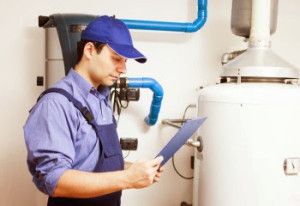How much do you know about your water heater? You know it heats your water, obviously, but beyond that… anything? Water heaters are an essential piece of plumbing and heating equipment, and because these systems are so complex, many homeowners do not have all the information they need when it comes time for a repair or upgrade. Keep reading to get the answers you need to the top water heater FAQs, courtesy of our experienced technicians at Meyer’s. And remember that when it comes to water heaters and more, we are available 24/7 for your essential service needs.
The Top 5 Water Heater Questions Asked by Homeowners:
- How Many Types of Water Heaters Are There? Basically there are two main types of water heaters: traditional tank water heaters and tankless systems. These types break down further based on fuel sources. For instance, you may have a water heater that runs on natural gas, or you may have a water heater that runs on electricity. The most important difference, however, is that traditional water heaters store your water in a tank, which then warms your water up whenever you turn on a tap. With tankless systems, on the other hand, your water is heated as it travels through the pipe by a gas burner or electric heating element.
- Which Type of Water Heater Is Better? The answer to this question varies greatly depending on your needs. Traditional tank water heaters are much less expensive to install, and are easier to service when you need a repair. Tankless water heaters, on the other hand, have a greater installation cost, and can be very expensive to fix if something goes wrong. That said, tankless systems are more energy-efficient, as they do not have to store your water in a tank and heat it over and over again. Their other major advantage of tankless water heaters, therefore, is that they are designed to provide a constant supply of hot water on-demand—i.e. no more waiting for the water to warm up during that cold morning shower. So while neither system is definitively better, they both present certain options depending on what you are looking for.
- What Is the Right Size Water Heater for Me? Again, the answer to this question depends on your needs, or rather, the needs of your entire household. If you live in a larger home, and/or have a big family, and you’re purchasing a traditional water heater, you’re going to need a system with a big tank. We’re talking a unit that can hold 56 gallons of water or more at a time. On the other hand, if you live in a household that only has two occupants, you will probably be fine with a water heater that only holds 23-36 gallons at once. For tankless systems, size is less important than flow rate. Larger households will require a system that can heat water at a greater GPM (gallons per minute) rate. As a rule of thumb, the more people in your household, and the more taps you are likely to run at once, the greater GPM you will need. One advantage of going tankless is that these systems are always physically pretty small, making them a good choice for less crowded households. Traditionally, the more people in your house, the more difficult it will be for your tankless system to meeting your needs—although thanks to advances in modern technology, tankless systems are increasingly becoming a good option for bigger homes, too.
- How Do I Know When It’s Time to Replace My Water Heater? The main thing to consider when contemplating water heater replacement is age. The average tank water heater can last 10-15 years with regular maintenance. Tankless systems can last up to 20 years. If you have recently moved into a new home, and do not know how old the current water heater is, look for the serial number somewhere on the unit. Water quality can also affect water heater replacement. That is to say that if you live in an area with hard, minerally water, your tank may wear down sooner rather than later (this factor mainly applies to traditional water heaters, obviously.) Other indicators that it’s time to replace your water heater include leaks, strange noises and smells, discolored or rusty-looking water, and an inability to heat your water soon enough.
- How Do I Help My Water Heater Last as Long as Possible? If you have a traditional water heater, the best way to extend its lifespan is to flush the sediment out of the tank once or twice a year. Getting your water heater tank drained regularly is particularly important if you live in an area with hard water, but it’s a good idea for all homeowners, if you want to extend the lifespan of your system. You should also replace your water heater’s anode rod periodically, as this component is specifically designed to prevent rust and corrosion. Beyond that, the most important thing you can do is simply to have your heater serviced regularly. A professional technician will not only be able to help you drain your tank when necessary, they will also be able to catch issues before they spiral out of control, and detect potential repairs to keep your home safer and your water heater functioning at peak efficiency.
For all your other questions about water heaters or to schedule service, call Meyer’s now at (219) 240-0610, or send us a message online.



.png)